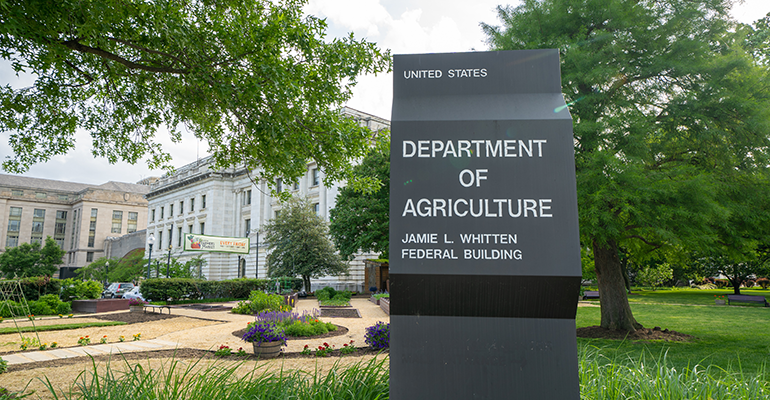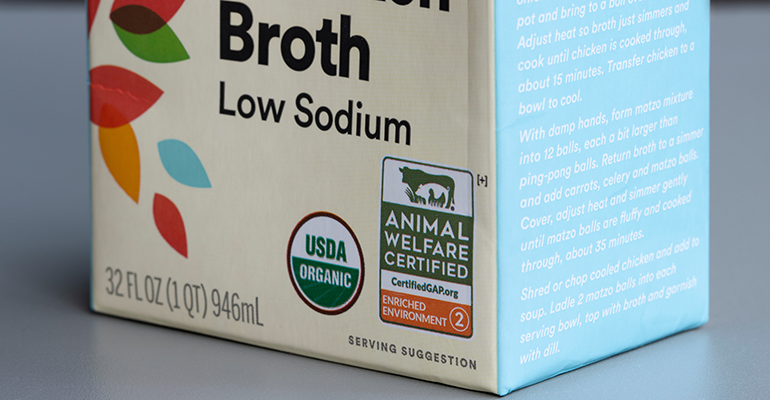News
Are brands ready for new USDA organic food rules?
21 Mar 2024The US Department of Agriculture’s (USDA) Strengthening Organic Enforcement rule will come into force on 19 March, with the aim of protecting consumers by preventing fraud in the organic supply chain. Are organic producers and brands ready?
US food manufacturers are gearing up for the Strengthening Organic Enforcement (SOE) final rule, which will come into force on the 19th March 2024. “This rule is necessary to better protect consumers by preventing fraud in the organic supply chain and is part of our continuous improvement of the organic standards,” a USDA spokesperson told Ingredients Network.

A significant milestone in organic law
The new organic rule aims to improve the management and enforcement of producing, handling, and selling organic agricultural products. It is designed to strengthen organic control systems, improve farm-to-market traceability, and enable robust application of the USDA organic regulations. The USDA hopes the rule amendment will protect integrity in the organic supply chain and build consumer and industry trust in the USDA organic label.
“With the new provisions under SOE, we will be able to oversee the supply chain and act more quickly to keep fraud out of the market. This means that, under the new rule, most businesses in organic trade will need to be certified organic,” added the USDA spokesperson.
The new regulation represents “the biggest change to organic regulations since the creation of USDA’s National Organic Program (NOP),” said the Organic Trade Association (OTA). With the Department’s National Organic Program dating back to The Organic Foods Production Act of 1990 (OFPA), the update marks a significant milestone in the organic regulatory landscape.
OTA, a business group for organic agriculture and products in North America, welcomes the new rule as “a major accomplishment” and actively confirms it advocated and engaged with the industry to help make it a reality. “This regulation will have significant and far-reaching impacts on the organic sector and will do much to deter and detect organic fraud and protect organic integrity throughout the supply chain,” it said in a January 2024 statement.
The rule strives to solidify existing laws surrounding organic products, bridges current regulatory gaps, and builds consistent certification practices. Together, these work to avoid fraud and improve organic products’ transparency and traceability.
Pursuing organic certification
USDA’s NOP published the SOE final rule on 19th January 2023. “Since the rule was published last year, many operations have already taken steps to get certified,” says the USDA spokesperson.
 © AdobeStock/MelissaMN
© AdobeStock/MelissaMN
Many operations have enrolled in the USDA’s SOE training in the Organic Integrity Learning Center, its spokesperson says. The Learning Center allows users to create accounts and self-enrol in the NOP-350 Strengthening Organic Enforcement (SOE) Final Rule Core Course. Since the rule was published, USDA NOP has been actively providing outreach by offering webinars, training, and attending industry events highlighting the rule’s requirements to help the industry prepare for implementation.
The spokesperson says the USDA cannot respond to business-specific questions or scenarios because businesses are so different. However, they were able to comment: “The rule is written to help businesses analyse their activities to assess the need for certification and how to implement its requirements.”
For example, the rule can help businesses ascertain whether a facility must be certified, which depends highly on the type of activities and products it handles. Businesses looking for specialised support in implementing rule requirements can work with a consultant or contact a USDA Accredited Certifying Agent, the spokesperson adds.
Impact on organic growers and producers
The new organic rules will affect organic food and drink brands. “It will offer a more robust endorsement for those who state their products are organic,” Vhari Russell, founder of the Food Marketing Experts, told Ingredients Network.
The cost consequences of the new organic rule are a concern in the fragile and uncertain financial landscape. “Unfortunately, it may impact price as there will inevitably be more administration for the grower and producer,” says Russell. “Brands are facing challenging times with rising costs, which could be another layer of red tape that doesn’t help them trade,” Russell added.
 © AdobeStock/Tada Images
© AdobeStock/Tada Images
Although the US market has implemented a new rule for brands to consider and work towards, Russell said, “It will be interesting to see what impact it has on the UK market and for those British brands looking to export to the US”.
Implementing the new rule will affect UK exporters and US importers, The Soil Association says. As of March 2024, movements of organic goods will need to be recorded and approved on the USDA’s online Global Organic Integrity Database.
The UK organic food and drink market is valued at €3.7 billion (£3.2 bn) and grew 2% in 2023, British charity The Soil Association reported in its Organic Market Report 2024, released in February 2024. The figures mark the organic market’s 12th consecutive year of positive growth. Despite the sector’s development, the UK market requires a “radical rethink if organic is going to reach its full potential and bring organic farming into the mainstream,” Soil Association certification commercial director Alex Cullen said.
“All regulations are put there to guide and make for better and more secure validation of types of foods, and let’s hope this does just that,” Russell added.
Related news

UK Government overhauls childhood obesity strategy
21 Nov 2025
The UK Government has announced a new package of measures designed to reverse the nation’s childhood obesity epidemic following the release of statistics revealing the scale of the crisis.
Read more
Nitrites: Pressure grows on UK to follow EU’s lead
20 Nov 2025
Pressure is growing on the UK to follow the EU’s lead after the bloc revised its regulations on the permitted levels of nitrites and nitrates in cured meats.
Read more
From fruit to functional solutions: Meet Paradise Fruits at Fi Europe in Paris
13 Nov 2025
Paradise Fruits Solutions and Paradise Fruits Health will showcase their combined expertise in delivering innovative, fruit-based solutions to the food and beverage industry at the upcoming Fi Europe trade show (2-4 December 2025, Paris).
Read more
Danone highlights digestive health as potential ‘tipping point’ for food industry
13 Nov 2025
Danone is betting on a food industry “tipping point” that will bloat the market for healthy products, particularly those related to gut health.
Read more
Soy story: WWF scores UK supermarkets on sustainability efforts
12 Nov 2025
WWF has published its latest “Soy Scorecard”, ranking UK supermarkets’ efforts to combat deforestation and land conversion in their soy supply chains.
Read more
New UPF standard hoped to offer consumers ‘coherence and clarity’
10 Nov 2025
Ingredients companies are being urged to enter “a new era of partnership and innovation” following the launch of the industry’s first non-UPF verification scheme.
Read more
Whistleblowers accuse UK meat industry of promoting cheap, unsustainable supply
7 Nov 2025
An anonymous group of industry insiders has accused the UK’s biggest food companies of systematically driving down meat quality and welfare standards.
Read more
Cottage cheese makes a comeback as consumers call for cleaner labels
6 Nov 2025
From ice cream to dips and ready meals, cottage cheese is experiencing a renaissance as a high-protein, clean ingredient for health-conscious consumers.
Read more
Bord Bia presents Irish dairy ingredient suppliers at Fi Europe
6 Nov 2025
Dairygold Co-operative Society, The Carbery Group, and Ornua Co-operative: Meet with sustainable producers of Irish dairy ingredients at Food ingredients Europe 2025, Hall 7.2 Stand M18.
Read more
Ingredient quantities mislabelled on popular protein bars, independent tests show
5 Nov 2025
Some popular protein bars contain more fat, carbs, and/or sugars than claimed on their labels, independent nutrition testing reveals.
Read more